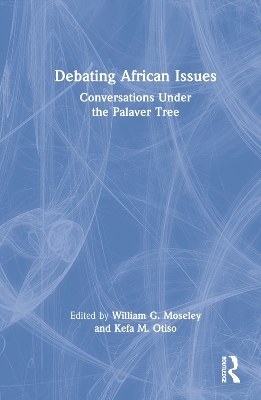
Debating African Issues
Routledge (Verlag)
978-0-367-20154-8 (ISBN)
This debate style textbook allows students to explore diverse, well-founded views on controversial African issues, pushing them to go beyond superficial interpretations and complicate and ground their understanding of the continent.
From the positive images in the film Black Panther, to the derogatory remarks of former American President Donald Trump, the African continent often figures prominently in the collective, global imagination. This interdisciplinary collection covers 20 enduring and contemporary debates across a broad range of subjects affecting Africa, from development and health to agriculture, climate change, and urbanization. Each chapter has a pro and con view penned by a leading expert on the topic in an accessible and engaging style. These contrasting views on each issue are framed by an introduction that helps the student contextualize the debate and draw on further resources. Moreover, they enable readers to deepen their understanding of the topic, develop a more nuanced perspective, and foster classroom debates.
This book is an excellent resource for Africa related courses across a range of disciplinary and interdisciplinary fields including African studies, anthropology, development studies, economics, environmental studies, geography, history, international studies, political science and public health.
William G. Moseley is DeWitt Wallace Professor of Geography, and Director of the Food, Agriculture and Society Program, at Macalester College, USA, where he teaches courses on human geography, agriculture, environment, development and Africa. Kefa M. Otiso is Professor of Geography and Graduate Coordinator for the School of Earth, Environment and Society (SEES) at Bowling Green State University, Bowling Green, USA. He’s also the founding president of the US-based Kenya Scholars and Studies Association (KESSA).
Chapter 1: Introduction to Debating African Issues: Conversations Under the Palaver Tree William G. Moseley and Kefa M. Otiso Section I: Historical and Global Context Chapter 2: Did European trade with Africans (including the slave trade) prior to 1700 damage or ruin economies on the continent? Toby Green and John Thornton Chapter 3: Was Africa more peaceful and prosperous prior to European contact? Mickie Mwanzia Koster and Charles Otoigo Choti Chapter 4: Did colonialism distort African development? Segbegnon Mathieu Gnonhossou and Ogechi Anyanwu Chapter 5: Is Africa’s border geography problematic? Sabelo J. Ndlovu-Gatsheni, Innocent Moyo and Marina Ottaway Section II: Development Issues Chapter 6: Is Africa truly rising? Thomas Jayne, Richard Mkandawire and Francis Owusu Chapter 7: Are foreign land acquisitions the latest form of neo-colonialism in Africa? Kerstin Nolte and Samuel Ledermann Chapter 8: Is China better than other outside powers in fostering African economic transformation? Kwame Adovor Tsikudo and Pádraig Carmody Chapter 9: Are cities engines of economic development in Africa? Ben Ofori-Amoah and Sarah Smiley Section III: Agriculture, Food and the Environment Chapter 10: Are parks the best way to protect African wildlife? Moses Mosonsieyiri Kansanga, Daniel Kpienbaareh and Rachel DeMotts Chapter 11: Are Africans adapting well to climate change? Muthoni Masinde and Julius R. Atlhopheng Chapter 12: Is the New Green Revolution approach the best way to address hunger in Africa? Glenn Denning and Hanson Nyantakyi-Frimpong Chapter 13: Does scholarship on African food insecurity have a rural bias? Jane Battersby and Eunice Njogu Section IV: Society, Health and Culture Chapter 14: Is modern African education counterproductive? Iddah Otieno and Apollos Nwauwa Chapter 15: Is the focus on the development of the girl child counterproductive? Rose Adhiambo Nyaondo and Wandia M. Njoya Chapter 16: Are Africa’s health resources overly focused on HIV/AIDS? Joseph Oppong and Kwadwo Adu Boakye Chapter 17: Is African religiosity a hindrance to development? John Taden and Samuel Zalanga Section V: Politics, Governance and Security Chapter 18: Is multi-party democracy the best form of governance in African countries? Nic Cheeseman and George Ayittey Chapter 19: Is the growing foreign military presence in many African countries counter-productive? Brendon J. Cannon and Andrews Atta-Asamoah Chapter 20: Do more women in politics lead to better governance in African countries? Mary Njeri Kinyanjui and Pamela Abbott Chapter 21: Has the proliferation of cell phones strengthened social movements in Africa? Frankline Matanji and Tanja Bosch
| Erscheinungsdatum | 30.08.2022 |
|---|---|
| Zusatzinfo | 1 Tables, black and white; 6 Line drawings, black and white; 2 Halftones, black and white; 8 Illustrations, black and white |
| Verlagsort | London |
| Sprache | englisch |
| Maße | 156 x 234 mm |
| Gewicht | 960 g |
| Themenwelt | Sozialwissenschaften ► Soziologie ► Spezielle Soziologien |
| ISBN-10 | 0-367-20154-2 / 0367201542 |
| ISBN-13 | 978-0-367-20154-8 / 9780367201548 |
| Zustand | Neuware |
| Haben Sie eine Frage zum Produkt? |
aus dem Bereich


